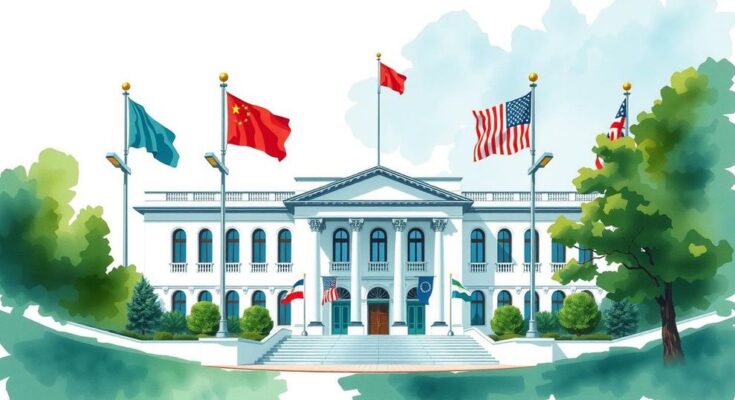South African Ambassador Ebrahim Rasool was expelled by U.S. officials, leading to significant diplomatic tensions. President Cyril Ramaphosa confirmed Rasool’s return, calling the situation a minor setback. The expulsion followed Rasool’s critical remarks about the Trump administration, prompting U.S. Secretary of State Marco Rubio to label him a “race-baiting politician.” Historical accusations against South Africa concerning anti-White policies further complicate relations amid ongoing geopolitical tensions.
On March 18, 2025, South African President Cyril Ramaphosa announced the return of Ebrahim Rasool, the country’s ambassador to the United States, following his expulsion by U.S. officials. The U.S. State Department had deemed Rasool unacceptable for diplomatic service, prompting concerns about South Africa’s relationship with the U.S. during his address at the Bana Pele Early Childhood Development Leadership Summit.
During his address, President Ramaphosa stated, “Ebrahim Rasool will be back soon. The U.S. State Department has ruled he is no longer acceptable in the United States. I will wait for a full report from him.” He characterized the situation as a minor setback and reaffirmed South Africa’s commitment to maintaining positive diplomatic engagement with the United States.
The expulsion stemmed from Rasool’s controversial remarks during an online lecture hosted by the Mapungubwe Institute for Strategic Reflection, in which he criticized the Trump administration. Rasool remarked, “What Donald Trump is launching is an assault on incumbency… by mobilizing a supremacism against the incumbency at home and abroad,” which evidently displeased U.S. officials, ultimately leading to his dismissal.
U.S. Secretary of State Marco Rubio referred to Rasool as a “race-baiting politician” and stressed that his expulsion was necessary as he was “no longer welcome in our great country.” Rubio’s remarks captured the increasing tensions between Washington and Pretoria since the Trump administration and coincided with the U.S. freezing assistance to South Africa earlier that year, citing unjust discrimination against white Afrikaners.
Historically, these political tensions have been longstanding, with the U.S. accusing the South African government of enacting anti-White policies, particularly concerning land reform laws. Critics of the Trump administration alleged that such accusations stem from misinformation and propaganda. Rasool’s time as ambassador from 2010 to 2015 was marked by efforts to mend any friction between the nations when he resumed his role last year despite these tensions.
The irony of Rasool’s expulsion came as South Africa sought to assert its diplomatic influence globally, particularly during its G20 presidency. Ramaphosa’s office expressed disappointment regarding the expulsion, highlighting the nation’s intent to foster beneficial ties with the United States amid rising tensions.
Rasool’s remarks during the webinar directly addressed the impact of the MAGA movement, warning of perceived threats associated with demographic shifts in the U.S. His statement, “We see it in the domestic politics of the USA, the MAGA movement as a response not simply to a supremacist instinct, but to very clear data showing great demographic shifts,” underscores the complexities surrounding racial politics that affect U.S.-South African relations.
The South African government rejected U.S. accusations regarding violence against white farmers, asserting that such incidents impact all farmers and reflect broader crime issues within the country. Rasool’s personal history, having been forcibly removed during apartheid, provides insight into his views on racism and politics in the United States, offering a contrast to narratives presented by the Trump administration.
Foreseeing the need for dialogue amidst these diplomatic strains, both nations face increasing pressure to engage each other. Allegations linking South Africa’s support for organizations like Hamas to anti-American sentiments further complicate the diplomatic landscape. The geopolitical tensions surrounding Rasool’s expulsion reflect deeper historical grievances and differing viewpoints regarding justice and equity. Nonetheless, there remains a glimmer of hope for enhanced engagement as authorities strive to navigate these conflicting narratives.
In summary, the expulsion of South Africa’s Ambassador Ebrahim Rasool by U.S. officials marks a significant development in the historical and ongoing tensions between the two nations. President Cyril Ramaphosa’s statement underscores South Africa’s commitment to positive engagement despite the diplomatic challenges. Rasool’s critical remarks about the U.S. administration and the broader implications of demographics in politics highlight the complexities of racial issues at play. As both nations grapple with these tensions and accusations, there lies an opportunity for improved dialogue navigating their conflicting narratives.
Original Source: evrimagaci.org




